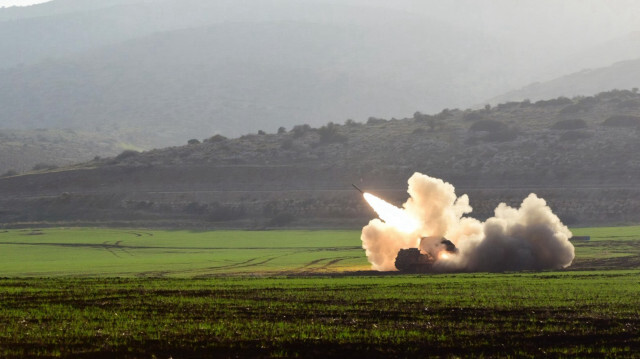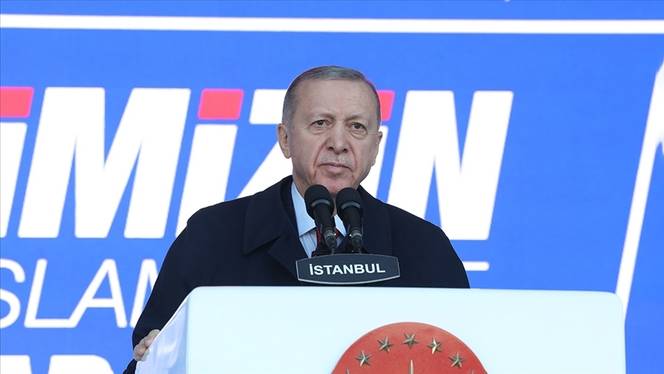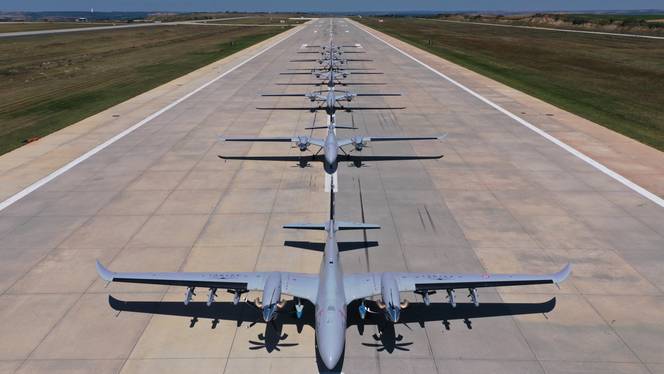Al Mayadeen – September 20, 2024
Hezbollah showers Israeli military sites in North with 200+ rockets
Hezbollah's Resistance fighters pound Israeli military sites with a guided missile and barrages of Katyusha rockets in support of Gaza and in response to Israeli assaults on Lebanese villages.
The Islamic Resistance in Lebanon - Hezbollah announced on Friday a new series of military operations against Israeli sites and soldiers "in support of the steadfast Palestinian people in the Gaza Strip and their brave and honorable Resistance and in response to the Israeli attacks on the steadfast southern villages and safe houses."
Hezbollah's operations came as follows:
The fighters of the Islamic Resistance bombed on Friday morning a positioning of Israeli occupation soldiers at the Metulla site with a guided missile, dealing a precise hit.
Later, Hezbollah's fighters shelled the main base of the Northern Command's air defense missile system in Berea Barracks with barrages of Katyusha rockets. The Resistance said the operation was in response to the Israeli assaults on southern Lebanese villages.
As part of the same response, the Lebanese Resistance group shelled the headquarters of the air and missile defense in Keila Barracks and the 188th Armored Brigade of the 36th Division at Aliqa Barracks also with barrages of Katyushas.
Al Mayadeen's correspondent pointed out that the Aliqa base, which was targeted for the first time, is located north of Katzrin in the occupied Syrian Golan and is about 20 km away from the Lebanese-Palestinian border.
Moreover, Hezbollah shelled the headquarters of the rocket and artillery battalion at the Yoav Barracks, the Golan Brigade's combat intelligence at the Yarden Barracks, and the Golan 210th Division in Nafah with volleys of Katyushas.
In addition, the Islamic Resistance bombed the newly established headquarters of the 91st Division in Ayelet HaShahar with a volley of Katyusha rockets.
Hezbollah also mourned its Resistance fighters martyrs Youssef Mohammad al-Sayyed "Naynawa" and Mohammad Ali Hassan al-Zein "Reda", from the southern Lebanese towns of Beit Lif and Qabrikha respectively, who were martyred on the path to [liberate occupied] al-Quds
Over 200 rockets launched from Lebanon
Israeli media confirmed that an anti-tank missile was launched toward Har Dov in the occupied Lebanese Shebaa Farms, reporting widespread sirens in northern occupied Palestine, particularly in Metulla.
According to the media, over 200 rockets were launched from Lebanon, targeting occupied al-Jalil, Safad, the occupied Golan Heights, and Mount Meron, with sirens sounding in more than 20 Israeli settlements.
Israeli media reported several injuries resulting from rocket explosions in the Ortal settlement in the northern occupied Golan Heights, following the launch of dozens of rockets from Lebanon.
Settlers in all areas of northern occupied Palestine heard the sounds of explosions due to the rocket fire, the media highlighted.
Moreover, they revealed that several rockets landed in the Safad area, leading to power outages and the outbreak of numerous fires in the region, where Israeli firefighting forces were prevented from responding to extinguish the fires due to concerns over additional rocket launches.
Meanwhile, the Israeli occupation continues its assaults on Lebanon, with Al Mayadeen’s correspondent confirming that the Israeli occupation forces targeted the outskirts of the southern town of Beit Lif.
Starting Thursday night through Friday, the occupation launched a series of airstrikes, described as the heaviest since October, targeting multiple areas in southern Lebanon.
The Israeli military claimed in a statement that it had struck approximately 100 Hezbollah launchers and additional infrastructure sites, "consisting of approximately 1000 barrels that were ready to be used in the immediate future."
Our correspondent reported that the number of Israeli airstrikes in the south, which targeted the outskirts of several villages and towns, exceeded 50.
The airstrikes included forested areas in al-Mahmoudiyeh, the outskirts of al-Aaichiyeh, the al-Rihan heights, and the vicinity of the Berghoz River, according to Lebanese media.
Additionally, Al Mayadeen's correspondent also noted that a series of Israeli airstrikes also targeted the Meidoun heights in Western Beqaa.
https://english.almayadeen.net/news/politics/hezbollah-showers-israeli-military-sites-in-north-with-200
Al Mayadeen – September 20, 2024
Israel bombs southern suburb of Beirut, Lebanon
The Israeli occupation forces launched an aggression on a residential building in the Lebanese capital's southern suburb.
The sounds of explosions ripped through Lebanon's capital Beirut on Friday as a strike targeted a residential building in the city's southern suburb.
The attack leveled the entire residential building to the ground. Initial reports indicate that three have been martyred and at least 17 were injured as a result of the attack, the Lebanese Ministry of Health stated shortly after.
In another update, the ministry said that eight people were martyred and 59 others were injured in the strike.
The Israeli occupation forces announced that they had carried out an airstrike on Beirut, pledging to publicize further details at a later time.
Al Mayadeen's correspondent said that the casualties include children and that the building is located in the al-Qaem neighborhood in the Southern Suburb of Beirut.
Our correspondent also reported that the Israeli strike was conducted via four missiles.
Emergency services arrived at the site of the Israeli aggression to aid the casualties.
Later on Friday, White House national security spokesperson, John Kirby, said that the United States was not informed of "Israel's" plan to conduct the strike ahead of time.
"I'm not aware of any prenotification of those strikes," Kirby said.
Sirens ring across Israeli settlements in Safad area
Almost an hour after the attack, sirens went off in multiple Israeli settlements in northern occupied Palestine, reaching the settlement of Kfar HaNassi and the occupied city of Safad.
At nearly 5:08 pm (local time) Israeli warning sirens rang off in the areas of Rosh Pina, Safad, Ma'ale Yosef, Merom, Mount Hermon, Zar'it, Shtula, Hatzor HaGilit, Amuka, Dalton, Bar Yochai, Safsufa, Kadita, Machanaim, Tzahar, Shomera, Biriyeh, Ayelet HaShachar, and Kfar HaNassi.
Israeli media reports indicate that a large barrage of rockets was launched at occupied territories after Hezbollah had fired more than 150 rockets at Israeli military sites on Friday morning.
Israeli terror regime carries on aggression on Lebanon
It is worth noting that these rocket attacks come after Israeli warplanes launched 52 raids on southern Lebanon on Thursday, claiming to have destroyed dozens of rocket launchers.
The strike on the Southern Suburb of Beirut on Friday and the intense raids on Thursday, come after the Israeli regime commissioned a wide-scale terror attack on Lebanon, detonating thousands of wireless communication devices.
In two separate wide-scale attacks that occurred on Tuesday and Wednesday, the Israeli regime detonated thousands of pagers and walkie-talkie wireless communication devices on Tuesday and Wednesday respectively.
As a result of these attacks, nearly 3,000 individuals were injured and another 37 were martyred.
Yet, the leader of the Islamic Resistance in Lebanon, Sayyed Hassan Nasrallah, has confirmed that the Resistance will continue to support the Palestinian people and expand its military campaign against the Israeli occupation's treacherous actions. His words are evident in the large-scale operations launched by the Resistance in the past few days, despite the continuous Israeli onslaught.
TRT World – September 20, 2024
Erdogan says Lebanon attacks underlines need to cut foreign dependence
Erdogan highlighted the growing importance of defense in the wake of recent attacks in Lebanon.
Turkish President Recep Tayyip Erdogan says that pager and walkie-talkie "cyber-terrorism" in Lebanon this week has underscored the need to produce more defense equipment within the country.
"We are making every effort to reduce our foreign dependence in the defense industry and not to be dependent on anyone in this field," he said on Friday, speaking at a gendarmerie ceremony in Istanbul.
"With the cyber-terrorist attacks against Lebanon, we have once again seen how vital this is."
Erdogan also spoke about the urgency of strengthening the technology sector in the face of new emerging challenges.
"We realise the value of our domestic and national software development projects, our national technology initiatives and our investments in electronic warfare systems. We will continue our efforts until we reach the goal of fully independent Türkiye in the defence industry. "
Erdogan said that terrorist organisations won't be given any breathing space inside and outside Türkiye’s borders, adding that 35,500 operations were carried out in 2024 against groups like the PKK, FETO, DHKP/C, and Daesh.
"We cannot make the slightest concession from Türkiye’s peace. We are extremely determined and resilient in this regard," he added.
Erdogan also took aim at "arms lobbies" and "blood merchants" who he claimed were threatened by Türkiye’s growth.
"Anyone who disturbs the peace of our nation will face the steel fist in the velvet glove of our state."
TRT World – September 20, 2024
Lebanon blasts show urgency of onshoring technology. Türkiye agrees
The walkie-talkie and pager explosions have exposed the perils of relying on imports for electronic products.
Karya Naz Balkiz
As the world watched in horror the explosions of pagers and walkie-talkies in Lebanon in a series of attacks blamed on Israel, the immediate focus shifted to the vulnerability of countries which import electronics.
Türkiye's Minister of Industry and Technology, Mehmet Fatih Kacır, was perhaps the most senior official anywhere to spell out what the governments were thinking in the immediate aftermath of the attacks.
"This incident has once again demonstrated how vital our national technology drive is," he said.
"Developing and producing critical technologies with our own domestic resources is not a choice, but an absolute necessity."
Experts say that Israel somehow intercepted the pager and walkie-talkie consignments on their way to Lebanon and planted explosives that were then detonated remotely.
Alpaslan Kesici, the general coordinator of the Turkish Cyber Security Cluster (TCSC), says the dependence on foreign technology involves many intentional or unintentional vulnerabilities, especially in critical infrastructures and strategic sectors including defence, energy systems, health and communications.
"This situation both increases cyber security threats and puts national security at risk," Kesici tells TRT World, adding that such dependence can cause major security gaps.
‘Israel has opened Pandora’s box’
The attacks also serve as a stark reminder of the vulnerabilities embedded in the global supply chain of electronic gadgets, which rely on many different countries and factories in both production and distribution processes.
A weakness at any point in the complex delivery process can give an opportunity to the enemy.
"The increasing sophistication of the so-called global value chains makes it very difficult to secure the entire supply chain. Israel has wide-opened the Pandora’s box. And what it has done may have serious repercussions on international trade," says Murat Yulek, rector of the OSTIM Technical University in Ankara.
The immediate impact of the explosions could be more border controls on imports of electronic and chemical goods, he says.
What happened in Lebanon will kickstart the race for homegrown technologies.
"The most effective way to mitigate these risks is to invest in developing domestic and national technologies, strengthen cyber security strategies and ensure supply chain security," says TCSC’s Kesici, who is also an advisor to Türkiye's Defence Industry Agency.
It would be a long-term strategy covering aspects ranging from national security to economic development.
Wealthy nations, including the US, Germany, and Japan, are increasingly onshoring production of high-tech equipment such as semiconductors to mitigate these risks. However, low-income and developing countries still rely heavily on imports for critical technologies.
Türkiye’s efforts to onshore tech
"Being closely located to an apartheid regime such as Israel makes life very difficult for all countries in the region," Yulek says, stressing an urgent need for countries in the Middle East to "revamp their national security."
Türkiye is among the leading countries in the drive for self-sufficiency, especially in areas such as defence and energy.
According to technology minister Kacır, this push has culminated in a significant shift in defence production, with Türkiye moving from importing most of its defence goods to producing 80 percent domestically.
Türkiye has become one the largest exporters of armed drones.
The country's efforts to onshore technology production is a step that not only strengthens national security, but also has important regional and global implications.
"Onshoring technology production will not only increase Türkiye’s independence, especially in critical areas such as the defence industry and cyber security, but also strengthen its foreign policy," Kesici says.
The move thus offers significant benefits beyond the country. By reducing reliance on foreign tech imports, Türkiye can strengthen its hand as a leader in the Middle East.
"Türkiye’s indigenous products, especially in the fields of defence and cyber security, can set an example for other countries in the region and increase strategic cooperation with them," according to Kesici.
The country’s technology exports can also contribute to strengthening the “security of military and civilian infrastructures in the region,” he adds.
Evolving landscape of warfare
While the attacks in Lebanon caught the world by surprise, they likely won’t be the last of their kind. Traditional military confrontations are increasingly complemented by sophisticated technological assaults that exploit everyday devices.
As nations navigate this evolving landscape of modern warfare, the importance of technological sovereignty has never been clearer. NATO has already recognised cyberspace as the fifth domain of warfare, alongside land, sea, air, and space.
Cyberspace can profoundly impact both military and civilian infrastructures, making it a critical component of national security strategies.
Countries that develop their own cybersecurity solutions maintain complete ownership and control over the technology, while imported solutions carry the risk of critical data falling into the hands of other nations and create dependence on external sources for updates, maintenance, and technical support, says cybersecurity expert Kesici.
Türkiye's Cyber Security Cluster plays a pivotal role in this area, enhancing national cybersecurity capacity, supporting the development of local solutions, and strengthening the country’s international standing in the technology sector, he adds.
On Thursday, Turkish Foreign Minister Hakan Fidan said that awareness of cybersecurity is growing significantly within Turkish institutions.
While an exclusive department is working under the ministry of transport and infrastructure, Fidan indicated the establishment of a dedicated national cybersecurity agency.
Anadolu Agency – September 20, 2024
Kremlin says Russian intelligence analyzing deadly explosions in Lebanon
Spokesman says pager blasts in Lebanon 'matter of significant interest' to Russian intelligence services
Elena Teslova |
The Kremlin said Friday that Russian special services are closely monitoring the pager explosions in Lebanon and will take appropriate action.
"This is a matter of significant interest to our intelligence services, and they will carry out their responsibilities," Kremlin spokesman Dmitry Peskov told reporters at a news conference in Moscow.
When asked if Moscow had engaged in discussions with regional players regarding the incident, Peskov responded: "No, there have been no discussions so far."…..
https://www.aa.com.tr/en/middle-east/kremlin-says-russian-intelligence-analyzing-deadly-explosions-in-lebanon/3336051
Anadolu Agency – September 20, 2024
Pager blasts in Lebanon:
Russia calls for global regulation to limit IT giants' power over digital tech
American IT companies are supported by US and allied intelligence agencies, which use their influence for espionage and interference in other countries' internal affairs, says Moscow
Elena Teslova |
Russia is calling on the global community to adopt legally binding international mechanisms to prevent IT giants from abusing their control over digital technologies, Foreign Ministry spokesperson Maria Zakharova said on Friday, expressing concern over two waves of communication device blasts in Lebanon.
Responding to a question from an Anadolu correspondent at a news conference in Moscow, she emphasized that Western corporations dominate key IT production, concentrating power in their hands.
"They restrict technology transfers to developing nations and states with independent policies, ensuring that their monopoly remains intact," Zakharova explained, adding that “this monopoly allows them to exert pressure and control processes.”
The official also noted that American IT companies are supported by US and allied intelligence agencies, which use their influence for espionage and interference in other countries' internal affairs.
She pointed out that companies such as Microsoft are shifting sovereign state management systems to cloud data storage in order to control national information spaces.
In response, Russia advocates for international cooperation mechanisms that protect state sovereignty and security in accordance with the UN Charter, while also fostering a secure and independent digital environment, she stressed.
"It is crucial to hold IT giants accountable for their products, ensuring that companies prevent the introduction of harmful backdoors into software. This is why we urge the global community to develop universal, legally binding tools in the area of international information security," she emphasized.
On Tuesday and Wednesday, 37 people were killed and more than 3,250 others, including women and children, injured in a series of explosions involving wireless communication devices, including pagers and two-way radios.
Later, a Hungarian news report suggested that Bulgarian-based Norta Global was involved in the sale of pagers to Lebanon-based group Hezbollah.
Earlier on Friday, Norwegian police announced to have launched a preliminary investigation into a Bulgarian-based company owned by a Norwegian citizen in connection with pager explosions.
So far, the case's clues point to Taiwan, Hungary, Bulgaria, and, now Norway.
Both Hezbollah and the Lebanese government have blamed Israel for the well-planned explosions.
Israel has yet to make any official comment on the deadly attacks. Even, the office of Israeli Prime Minister Benjamin Netanyahu distanced itself from a post on X by his advisor Topaz Luk, which hinted at Tel Aviv was responsible for the explosions.
Several countries condemned the pager explosions and expressed solidarity with Lebanon, while international human rights organizations, including Human Rights Watch, warned that such attacks endanger civilian lives and violate wartime laws.
The mass explosion of pagers came amid an exchange of cross-border attacks between Hezbollah and Israel against the backdrop of a brutal Israeli offensive on the Gaza Strip, which has killed over 41,300 people, mostly women and children, and injured over 95,000 others following a Hamas attack last October.
TRT World – September 20, 2024
Türkiye leads global drone exports, surpassing US and China
Report shows Türkiye accounted for 65 percent of drone sales, with China taking up 26 percent, and the US just eight percent since 2018.
Experts describe Bayraktar drones as game-changers on the battlefield, with popularity extending beyond Asia and Africa to NATO and EU member states. 
Türkiye has become the world's largest supplier of unmanned aerial vehicles (UAVs), driven by the success of its drones in conflict zones such as Azerbaijan, Ukraine, and Libya.
Data from the Center for a New American Security (CNAS) regarding the global market for military UAVs highlights Türkiye’s rise to the top owing to its strong performance in recent years.
The report notes that drone technology has become increasingly widespread over the past 30 years, with a growing number of state and non-state actors acquiring these capabilities.
According to CNAS data, China, Türkiye, and the US have made a combined total of 69 sales of armed military drones to 40 different nations since 2018.
Türkiye accounted for 65 percent of the sales, with China taking up 26 percent, and the US just eight percent.
Türkiye’s defence industry has deployed 12 domestically produced aircrafts, ranging from drones to fighter jets, in last two decades
China, for its part, reached its peak in drone sales in 2014, but by 2021, Türkiye cornered the market and became the world’s largest supplier.
The report attributes this to Turkish drones’ effectiveness in conflicts in Libya, Karabakh, and Ukraine.
Experts describe Bayraktar drones as game-changers on the battlefield, with popularity extending beyond Asia and Africa to NATO and EU member states.
Since September 2024, Bayraktar TB2 drones have been part of the inventories of six NATO countries and four EU nations, continuing to perform their missions successfully.
https://www.trtworld.com/turkiye/turkiye-leads-global-drone-exports-surpassing-us-and-china-18210402

|
Published since July 2008 |
Your donation
is tax deductable.
The Journal of America Team:
Editor in chief:
Abdus Sattar Ghazali
Senior Editor:
Prof. Arthur Scott
Special Correspondent
Maryam Turab




